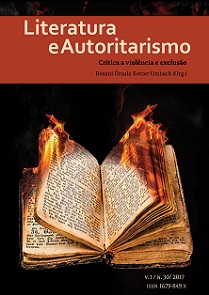The deformation of the subject in the novel Sozaboy, by Ken Saro-Wiwa
DOI:
https://doi.org/10.5902/1679849X28651Keywords:
Ken Saro-Wiwa, Sozaboy, Bildung, DeformationAbstract
This article intends to defend the argument that there is no “formation” at stake in Sozaboy, novel by writer and political and environmental activist Ken Saro-Wiwa, at least not according to the terms of the Bildung or the Bildungsroman. In order to present this thesis, the text is divided into two fundamental parts. First, it presents a brief introduction to the historical meaning of the concepts here discussed, “formation” (Bildung) and “novel of formation” (Bildungsroman). After that, the article analyzes the novel Sozaboy, noting that, less than a “novel of formation,” Saro-Wiwa describes a singular deformative process, which, as such, requires from the reader another epistemology, a negative epistemology concerning the destruction of the subject.Downloads
References
ACHEBE, Chinua. A educação de uma criança sob o protetorado britânico. São Paulo: Companhia das Letras, 2012.
EKE, Maureen N. The Novel: Sozaboy: a Novel in Rotten English. In: MCLUCKIE, Craig W., MCPHAIL, Aubrey (Eds.). Ken Saro-Wiwa: Writer and Political Activist. London: Lynne Rienner Publishers, 2000.
GOETHE, J. W. Os anos de aprendizado de Wilhelm Meister. Trad. Nicolino Simone Neto. São Paulo: Ensaio, 1994.
GOMES, Celina de Oliveira Barbosa. Desalienação e a configuração do Bildungsroman em Sozaboy, de Ken Saro-Wiwa. Dissertação (Mestrado em Estudos Literários). Universidade Estadual de Londrina, Londrina: 2015, 108 f.
KANT, Immanuel. Reposta à pergunta: Que é “Esclarecimento”? In: Textos seletos. 2. ed. Trad. Raimundo Vier. Petrópolis: Vozes, 1985.
LUKÁCS, Georg. A teoria do romance. Trad. José Marcos Mariani de Macedo. São Paulo: Duas Cidades; Ed. 34, 2000.
MASS, Wilma Patrícia. O cânone mínimo: o Bildungsroman na história da literatura. São Paulo: Editora UNESP, 2000.
M'BOKOLO, Elikia. África Negra: história e civilizações. Tomo II (Do século XIX aos nossos dias). Salvador: EDUFBA; São Paulo: Casa das Áfricas, 2011.
NNOLIM, Charles E. Approaches to the African Novel. 3. ed. Lagos: Malthouse, 2010.
NORTH, Michael. Ken Saro-Wiwa’s Sozaboy: The Politics of the “Rotten English”. Public Culture. England, v. 13, n. 1, apr/aug. 2001, p. 97-112.
SARO-WIWA, Ken. Sozaboy. New York: Longman Publishing Group, 1994.
SCHILLER, F. A educação estética do homem. Trad. Roberto Schwarz e Márcio Suzuki. São Paulo: Iluminuras, 2011.
SCHLEGEL, Friedrich. O dialeto dos fragmentos. Trad. Márcio Suzuki. São Paulo: Iluminuras, 1997.
SIMOLA, Raisa. The Question of Identity during the Nigerian Civil War (1967-1970) in the Fiction of Flora Nwapa and Ken Saro-Wiwa. In:
PALMBERG, Mai (Org.). National Identity and Democracy in Africa. Cape Town: Capture Press, 1999, p. 80-100.
SUBIRATS, Eduardo. “Kafka, Rulfo, Beckett: retorno ao mito”. In: CECHINEL, André. (Org.). O lugar da teoria literária. Florianópolis: EdUFSC; Criciúma: Edinesc, 2016, p. 241-260.
Downloads
Published
How to Cite
Issue
Section
License
DECLARAÇÃO DE ORIGINALIDADE E EXCLUSIVIDADE E CESSÃO DE DIREITOS AUTORAIS
Declaro que o presente artigo é original e não foi submetido à publicação em qualquer outro periódico nacional ou internacional, quer seja em parte ou na íntegra. Declaro, ainda, que após publicado pela Literatura e Autoritarismo, ele jamais será submetido a outro periódico. Também tenho ciência que a submissão dos originais à Literatura e Autoritarismo implica transferência dos direitos autorais da publicação digital. A não observância desse compromisso submeterá o infrator a sanções e penas previstas na Lei de Proteção de Direitos Autorais (nº 9610, de 19/02/98).






